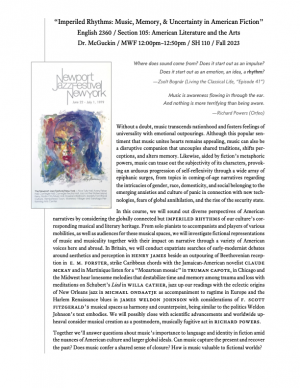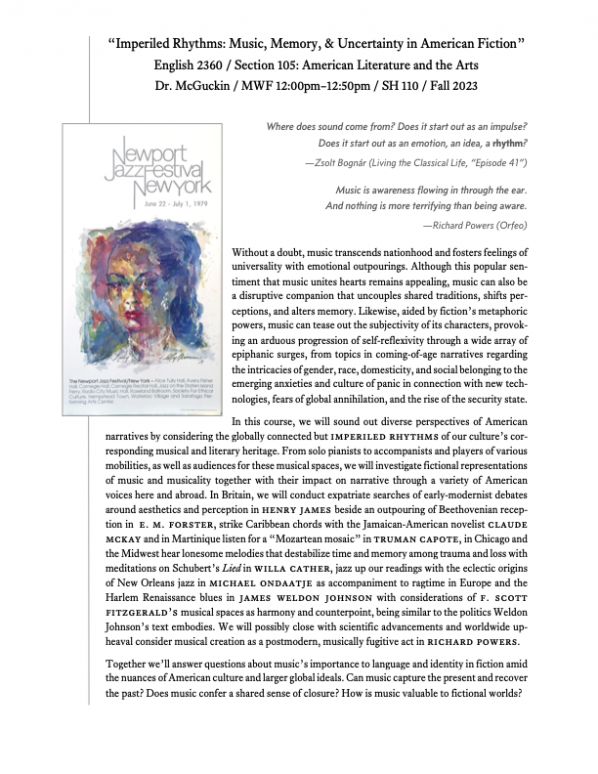ENG 2360: American Literature and the Arts: Imperiled Rhythms: Music, Memory, & Uncertainty in American Fiction
Dr. Ryan James McGuckin
MWF 12:00pm–12:50pm
Without a doubt, music transcends nationhood and fosters feelings of universality with emotional outpourings. Although this popular sentiment that music unites hearts remains appealing, music can also be a disruptive companion that uncouples shared traditions, shifts per- ceptions, and alters memory. Likewise, aided by fiction’s metaphoric powers, music can tease out the subjectivity of its characters, provok- ing an arduous progression of self-reflexivity through a wide array of epiphanic surges, from topics in coming-of-age narratives regarding the intricacies of gender, race, domesticity, and social belonging to the emerging anxieties and culture of panic in connection with new tech- nologies, fears of global annihilation, and the rise of the security state.
In this course, we will sound out diverse perspectives of Americannarratives by considering the globally connected but imperiled rhythms of our culture’s cor- responding musical and literary heritage. From solo pianists to accompanists and players of various mobilities, as well as audiences for these musical spaces, we will investigate fictional representations of music and musicality together with their impact on narrative through a variety of American voices here and abroad. In Britain, we will conduct expatriate searches of early-modernist debates around aesthetics and perception in henry james beside an outpouring of Beethovenian recep- tion in e. m. forster, strike Caribbean chords with the Jamaican-American novelist claude mckay and in Martinique listen for a “Mozartean mosaic” in truman capote, in Chicago and the Midwest hear lonesome melodies that destabilize time and memory among trauma and loss with meditations on Schubert’s Lied in willa cather, jazz up our readings with the eclectic origins of New Orleans jazz in michael ondaatje as accompaniment to ragtime in Europe and the Harlem Renaissance blues in james weldon johnson with considerations of f. scott fitzgerald’s musical spaces as harmony and counterpoint, being similar to the politics Weldon Johnson’s text embodies. We will possibly close with scientific advancements and worldwide up- heaval consider musical creation as a postmodern, musically fugitive act in richard powers.
Together we’ll answer questions about music’s importance to language and identity in fiction amid the nuances of American culture and larger global ideals. Can music capture the present and recover the past? Does music confer a shared sense of closure? How is music valuable to fictional worlds?

